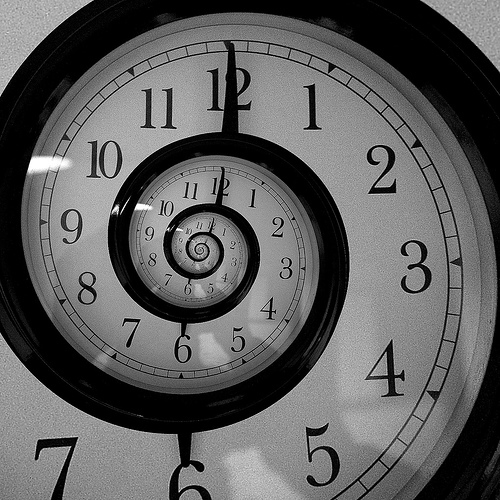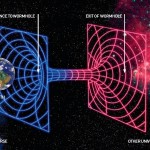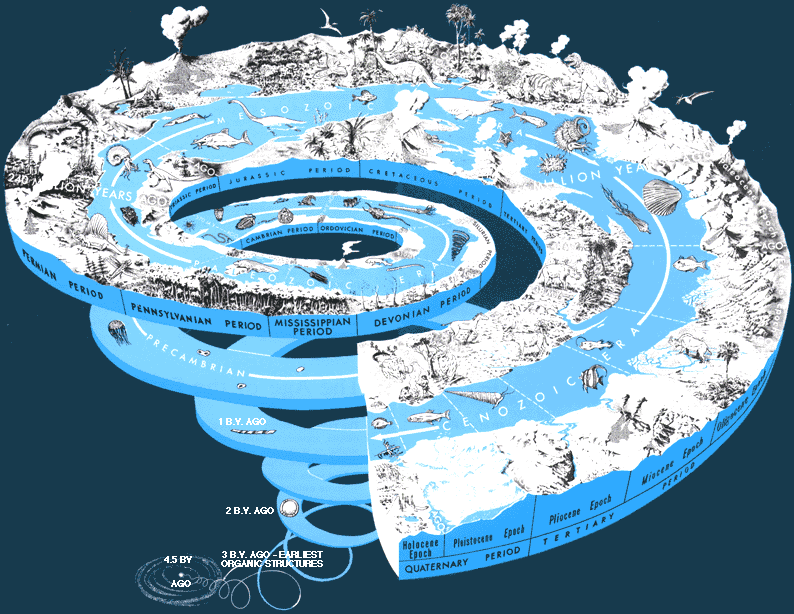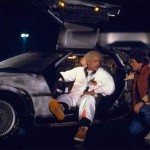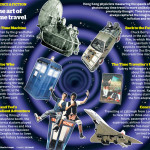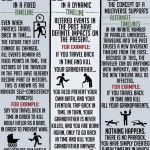Goodreads lists 308 books about time travel, though there must be many more. The daddy of them all is HG Wells‘s The Time Machine, though stories of time travel apparently date back to much earlier mythology. Goodness knows how many movies have covered the subject from one aspect or another, but here is the Totalfilm list of their top 50, of which the original Back to the Future is listed at no 1 – though it might equally have been adaptations like The Time Traveller’s Wife or Slaughterhouse Five for example. Even this last Christmas I was given the DVD of Looper as a present, and totting up my DVD collection finds half a dozen with similar themes. In fact, Wikipedia lists no fewer than 266 films including some element of time travel, forwards or backwards. Oh, and that this is without TV programmes on similar topics, of which the best known must be Doctor Who, of course!
Reading the Wikipedia page on time travel reveals there is a welter of pseudo-science, hypothetical science fiction and even philosophy explaining how it might occur, quite apart from the suggestion that it already does courtesy of people coming back from the future to change our world and thereby reshape events yet to happen. This is of course one of the immutable laws of time travel: if when in a previous era you must never do something which changes the course of history – though those with evil intent may not care about that (see the Terminator series, for example.) However, there are various ways around the “Grandfather paradox” and similar disturbances in the fabric of time, depending on the internal logic of the story you are reading.
A more fundamental question is whether you would want to go back to murder somebody who turned out to be evil, or to have invented a device to wipe out humanity, given that any of us has the power for good or evil and are not intrinsically bad, and indeed that by changing the balance of history may result in unforeseen consequences, as with the butterfly effect. By taking out one person we may unwittingly have caused even greater evil to be perpetrated. When Kissinger authorised the bombing of neutral Cambodia, allegedly to take out Viet Cong rebels stationed over the border, the indirect effect of his actions was to enable the Khmer Rouge to take power and kill millions of their fellow citizens, not that Kissinger had the benefit of hindsight. Even so, the moral should be not to mess with the future unless you are very certain it won’t come back to bite you, even if you do so with the best of intentions.
I’ve copied below a set of rules of time travel as documented by Wikipedia, but for these purposes I posed myself a simpler question: why would time travel appeal to me, assuming the means were within easy reach?
In Slaughterhouse Five, Billy Pilgrim has no choice but to engage in random travel up and down his own lifespan, so we can start by discounting that possibility and consider that time travel is a voluntary act to a time and place of our own choosing, merely to observe events and not participate. Maybe we could even be invisible to contemporary citizens in the notional reconstruction of events past, all the better to understand what really happened, as opposed to histories written from a restricted set of documentary evidence, fragmented memories, or even deliberate distortions. Our current secretary of state for education believes in reinterpreting history to teach children
Given that history is never written retrospectively without an agenda of some sort, wouldn’t it be nice to see for yourself and circumvent a world of reinterpretations? What really happened in JFK’s assassination, for example, though to know the truth you would need replays and to be in different places each time to see the collusion of events from every perspective – and if not you may not have sufficient information to determine the reality. Which conspiracy theory is most accurate, if any? Who knows, but I’m damn sure the version propagated by the Warren Commission is anything but the truth, the whole truth and nothing but the truth.
An adjunct to the same motive might simply be to have been present at great moments in history, to witness events as they occurred for no better reason than the experience. Somebody said to me on the 50th anniversary of Martin Luther King‘s infamous “I have a dream“ speech that it would great to have heard the full power of the words spoken and to have felt the atmosphere, to be part of the feeling of solidarity, to feel the shiver down your spine. There must be a thousand more iconic moments where just to have been there would have been the fulfilment of an ambition – all the more so if you could have made it but didn’t. Maybe the ones listed here would not be among your chosen moments, but then you might have chosen Dylan picking up an electric guitar instead!
While you’re mulling that one over, there is a second, more personal motive for wanting to go back. You may want to relive precious moments, spend a last few minutes seeing a loved one, correcting any stupid but inconsequential behaviour, changing something you said in error. Have we all not wished we could have time again to replay a situation? If you recall another movie, Groundhog Day, Bill Murray‘s character gets many shots at the same day until, at long last, he gets it right – and I suspect that we would all need many goes to say exactly the right things at the right time. The moral of that seems to be that since we can’t repeat any situation over and again, stop aiming for perfection and just try to do and say the right things at the right times for the right reasons, knowing you will screw up on occasions.
Come to think of it, “if I could have my time again…” seems to be a phrase in common circulation everywhere nowadays, suggesting there are many life choices we would make differently if we could give our younger selves a good stern talking to – as Bruce Willis does to his younger self in Looper. That seems to be a great motive – to do better without impacting anyone else, but the same rule about consequences still applies. One such question might be who we chose to marry, but the corollary reads “…I can’t regret it though because if I hadn’t married X I wouldn’t have had my beautiful children.” Who knows what would have happened otherwise? “Regrets, I’ve had a few…”
Thus far all I’ve mentioned is about going backwards, but there is the forwards option too. That might include a range of interesting possibilities such as:
- How my children succeed after I am dead and gone
- Whether my club will ever succeed again
- How events regarding whatever issue play out (eg. climate – are we killing the earth, and what will we do to prevent disaster?)
- How life will change over 20/50/100 years.
The last one is interesting. For all the bizarre ideas dreamed up for how “life in the future” might look when we were young, in some ways we have moved light years ahead while in others we haven’t moved at all. Our cars are still largely powered by the internal combustion engine, yet we have achieved miracles of advancement
Looking at past predictions (with varying degrees of accuracy, from Nostradamus to others – here, here and here), I wonder how these and these predictions will fare. Technological innovations notwithstanding, we remain human and fallible, so our ability to cope with our foibles and natural disasters may be the key to success or otherwise (see here and here.) If would indeed be fascinating to see if mankind has developed any greater wisdom to accompany our skills.
So back to the big theme, if there was an opportunity to engage in time travel, where and when would you visit, and why? Seems variants of the key ideas have been explored ad nauseum in fiction and the movies, but I suspect we all have secret hankerings to know more than our lifetimes will ever permit. While there may come a time when tourist flights into space become reality, I can’t see us ever breaching the space-time continuum any time soon, or at least until the next Einstein finds a way to circumvent the laws of quantum physics anyway. Never mind, there is always a keen appetite for science fiction to tide us over, and Hollywood seems to find time travel a source of endless fascination.
***
Time travel themes in science fiction and the media can generally be grouped into two general categories (based on effect—methods are extremely varied and numerous) each of which can be further subdivided. However, there are no formal names for these two categories, so concepts rather than formal names will be used with notes regarding what categories they are placed under (Note: These classifications do not address the method of time travel itself, i.e. how to travel through time, but instead call to attention differing rules of what happens to history.). As used in this section, timeline refers to all physical events in history, so that in time travel stories where events can be changed, the time traveler can create a new or altered timeline. This usage of “timeline” is fairly common in time travel fiction,[79] and is distinct from the usage of “timeline” to refer to a type of chart created by humans to illustrate a particular series of events (seetimeline). This concept is also distinct from the concept of aworld line, a term from Einstein’s theory of relativity which refers to the entire history of a single object (usually idealized as a point particle) that forms a distinct path through 4-dimensionalspacetime.
-
1. There is a single fixed history, which is self-consistent and unchangeable. In this version, everything happens on a single timeline which does not contradict itself and cannot interact with anything potentially existing outside of it.
A man travelling a few seconds into the past in a single self-consistent timeline. This scenario raises questions about free will, since once the traveller has decided to enter the time machine, then as soon as his own double appears, there is absolutely no way for him to change his mind.
- 1.1 This can be simply achieved by applying the Novikov self-consistency principle, named after Dr. Igor Dmitrievich Novikov, Professor of Astrophysics at Copenhagen University. The principle states that the timeline is totally fixed, and any actions taken by a time traveler were part of history all along, so it is impossible for the time traveler to “change” history in any way. The time traveler’s actions may be the cause of events in their own past though, which leads to the potential for circular causation and the predestination paradox; for examples of circular causation, see Robert A. Heinlein‘s story “By His Bootstraps“. In fiction, these phenomena are often referred to as “stable time loops”. The Novikov self-consistency principle proposes that the local laws of physics in a region of spacetime containing time travelers cannot be any different from the local laws of physics in any other region of spacetime.
- 1.2 Alternatively, new physical laws take effect regarding time travel that thwarts attempts to change the past (contradicting the assumption mentioned in 1.1 above that the laws that apply to time travelers are the same ones that apply to everyone else). These new physical laws can be as unsubtle as to reject time travelers who travel to the past to change it by pulling them back to the point from when they came asMichael Moorcock‘s The Dancers at the End of Time or where the traveller is rendered a noncorporeal phantom unable to physically interact with the past such as in some Pre-Crisis Superman stories and Michael Garrett’s “Brief Encounter” in Twilight Zone Magazine May 1981.
- 2. History is flexible and is subject to change (Plastic Time)
- 2.1 Changes to history are easy and can impact the traveler, the world, or both
- Examples include Doctor Who and the Back to the Future trilogy. In some cases, any resulting paradoxes can be devastating, threatening the very existence of the universe. In other cases the traveler simply cannot return home. The extreme version of this (Chaotic Time) is that history is very sensitive to changes with even small changes having large impacts such as in Ray Bradbury’s “A Sound of Thunder“.
- In Doctor Who the Doctor claims time can be changed at any moment. In the Fourth Doctor story Pyramids of Mars his companion Sarah Jane Smith says they can leave 1911, despite the alien Sutekh trying to break free, as she comes from 1980 and knows the world wasn’t destroyed in 1911. The Doctor takes her to 1980 and shows the world has been destroyed as they didn’t stop Sutekh. The Doctor claims a man can change the course of history, but it takes a being of Sutekh’s power to destroy the future.
- 2.2 History is change resistant in direct relationship to the importance of the event i.e., small trivial events can be readily changed but large ones take great effort.
- In the Twilight Zone episode “Back There” a traveler tries to prevent the assassination of President Lincoln and fails, but his actions have made subtle changes to the status quo in his own time (e.g. a man who had been the butler of his gentleman’s club is now a rich tycoon).
- In the 2002 remake of The Time Machine, it is explained via a vision why Hartdegen could not save his sweetheart Emma—doing so would have resulted in his never developing the time machine he used to try and save her.
- In The Saga of Darren Shan, major events in the past cannot be changed, but their details can alter while providing the same outcome. Under this model, if a time traveler were to go back in time and kill Hitler, another Nazi would simply take his place and commit his same actions, leaving the broader course of history unchanged.
- In the Doctor Who episode The Waters of Mars, Captain Adelaide Brooke’s death on Mars is the most singular catalyst of human travel outside the solar system. At first, the Doctor realizes her death is a “fixed point in time” and does not intervene, but later defies this rule, realising that he is the last Time Lord and therefore is in charge of the laws of time, and transports her and her crew to Earth. Rather than allow human history to change, Captain Brooke commits suicide on Earth, leaving history mostly unchanged. Similarly in Vincent and the Doctor the Eleventh Doctor and Amy Pond change history so artist Vincent Van Gogh will know he is appreciated in the future. However despite this he still commits suicide.
Time travel under the parallel universehypothesis. This scenario has the potential to preserve free will, but breaks symmetrybetween universes.
- 3. Alternate timelines. In this version of time travel, there are multiple coexisting alternate histories, so that when the traveler goes back in time, he/she ends up in a new timeline where historical events can differ from the timeline he/she came from, but his/her original timeline does not cease to exist (this means the grandfather paradox can be avoided since even if the time traveler’s grandparent is killed at a young age in the new timeline, he/she still survived to have children in the original timeline, so there is still a causal explanation for the traveler’s existence). Time travel may actually create a new timeline that diverges from the original timeline at the moment the time traveler appears in the past, or the traveler may arrive in an already existing parallel universe (though unless the parallel universe’s history was identical to the time traveler’s history up until the point where the time traveler appeared, it is questionable whether the latter version qualifies as ‘time travel’).
- James P. Hogan’s The Proteus Operation fully explains parallel universe time travel in chapter 20 where it has Einstein explaining that all the possible outcomes already exist and all time travel does is change which already existing branch you will experience.
- Doctor Who has featured many alternate timelines such as The Day of the Daleks (see above). In Pyramids of Mars the Doctor claims “Every point in time has its alternative”.
- Though Star Trek has a long tradition of using the 2.1 mechanism, as seen in “The City on the Edge of Forever“, “Tomorrow Is Yesterday“, “Time and Again“, “Future’s End“, “Before and After“, “Endgame” and as late as Enterprise’s Temporal Cold War, “Parallels” had an example of what Data called “quantum realities.” His exact words on the matter were “But there is a theory in quantum physics that all possibilities that can happen do happen in alternate quantum realities”, suggesting the writers were thinking of the many-worlds interpretation of quantum mechanics.
- Michael Crichton’s novel Timeline takes the approach that all time travel really is travel to an already existing parallel universe where time passes at a slower rate than our own but actions in any of these parallel universes may have already occurred in our past. It is unclear from the novel if any sizable change in events of these parallel universe can be made.
- In the Homeline setting of GURPS Infinite Worlds there are echos—parallel universes at an early part of Homeline’s history but changes to their history do not affect Homeline’s history. However tampering with their history can cause them to shift quanta making access harder if not impossible.
- A type of story which could be placed in this category is one where the alternative version of the past lies not in some other dimension, but simply at a distant location in space or a future period of time that replicates conditions in the traveler’s past. For example, in a Futurama episode called The Late Philip J. Fry, the professor designed a forward-only time travel device. Trapped in the future, he and two colleagues travel forward all the way to the end of the universe, at which point they witness a new Big Bang which gives rise to a new universe whose history mirrors their own history. Then they continue to go forward until they reach the exact time of their initial departure, where they accidently kill that Universe’s versions of themselves and take their place. Although this journey is not exactly a backward time travel, the final result is the same.
- In the Japanese manga, Dragon Ball Z, the character Trunks travels back in time to warn the characters of their deaths soon to come. This does not change his time line, only creates a new one in which they do not die. Soon two of the characters destroy the lab where the monster Cell is being created, stopping him from absorbing the androids, creating a third time line. Later it is revealed that Trunks is killed by Cell in the future, then travels to three years before any of the events occurs, which creates a fourth time line. No matter what any character does in the past, their own original time line is unchanged.
- In Déjà Vu the main character travels several times between parallel timelines to solve the criminal case. Timelines are very similar and he fails to solve and stop the crime in first two attempts but succeeds in the last timeline. Main hero who came to the last timeline dies while stopping the crime, so the paradox of meeting himself is avoided.
- In Terminator 2: The New John Connor Chronicles by Russell BlackfordSkynet and the resistance have created at least three timelines due to use of Time Displacement Equipment. The resistance in one timeline discovers how to travel from one timeline to another, and fears that Skynet will learn this and destroy humanity throughout the Terminator multiverse. Therefore, they set out to destroy Skynet in each timeline.
- In the Japanese visual novel, “Steins;Gate” the protagonist Okabe Rintarou learns to travel in between “World lines” that act as alternate timelines based on changes done to the world through his abilities to send text messages into the past. These changes were calculated by a device known as a “Divergence Meter” that would measure changes by number values below 0, with a measure above 1 indicating a shift in line stronger enough to shift to him to a world with a drastically changed history.
-
-
In Marvel Comics it is claimed time travel creates alternate timelines. The time-traveller Kang the Conqueror creates alternate versions of himself due to his time travel. However travel through these alternate timelines is possible, which Kang uses to kill all alternate versions of him.
-

